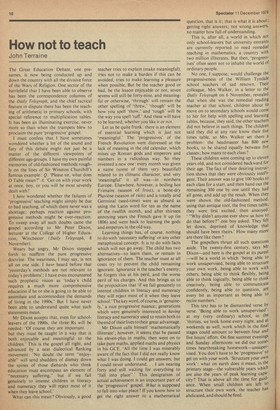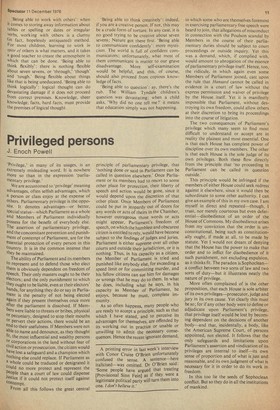How not to teach
John Terraine
The Great Education Debate, one presumes, is now being conducted up and down the country with all the divisive force of the Wars of Religion. One sector of the battlefield that I have been able to observe has been the correspondence columns of the Daily Telegraph, and the chief tactical feature in dispute there has been the teach ing of arithmetic in primary schools, with special reference to multiplication tables. It has been an illuminating exercise, never more so than when the trumpets blew to proclaim the pure 'progressive' gospel.
I must confess that I have sometimes wondered whether a lot of the sound and fury of this debate might not just be a matter of the different viewpoints of different age-groups. I have my own painful memories of old-fashioned methods roughly on the lines of Sir Winston Churchill's famous example: Q. 'Please sir, what does 0 Table mean?' A. 'Get on with your work at once, boy, or you will be most severely dealt with!'
I have wondered whether the failures of 'progressive' teaching might simply be due to bad teaching, of which there never was a shortage; perhaps reaction against progressive methods might be over-reaction. To sweep away all such doubts came the gospel according to Mr Peter Dixon, lecturer at the College of Higher Education, Winchester (Daily Telegraph, 8 November).
Weary but angry. Mr Dixon stepped forth to reaffu-m the pure progressive doctrine. The weariness, I may say, is not all on one side. I have heard before that 'yesterday's methods are not relevant to today's problems': I have even encountered such prophetic vision as 'today's child requires a much more comprehensive education if he or she is going to be able to assimilate and accommodate the demands of living in the 1990s.' But I have never been able to understand quite what such statements mean.
Mr Dixon accepts that, even for schoolleavers of the 1990s, the three Rs will be needed: 'Of course they are important. . . but they must be taught in a way that is both enjoyable and meaningful to the children.' This is the gospel all right, and advanced by a neat dialectical flanking movement: 'No doubt the term "enjoyable" will send shudders of dismay down the spines of those diehards who think education must encompass an element of "necessary suffering," but if we fail genuinely to interest children in literacy and numeracy they will reject most of it when they leave school.'
What can this mean? Obviously, a good teacher tries to explain (make meaningful), tries not to make a burden if this can be avoided, tries to make learning a pleasure when possible. But be the teacher good or bad, be the lesson enjoyable or not, seven sevens will still be forty-nine, and meaning ful or otherwise, 'through' will remain the other spelling of 'threw,' 'though' will be how you spell 'thow,' and 'tough' will be the way you spell 'tuff.' And these will have to be learned, whether you like it or not.
Let us be quite frank: there is an element of essential learning which is just not 'meaningful.' The 'progressives' of the French Revolution were distressed at the lack of meaning in the old calendar, which mixes up Roman gods and emperors and numbers in a ridiculous way. So they invented a new one: every month was given a name (some of them very beautiful) related to its climatic character, and very 'meaningful' it all was—in northern Europe. Elsewhere, however, a boiling hot Frimaire (season of frost), a bone-dry PluviOse (season of rain) and a totally arid Germinal (seed-time) were as absurd as using the Latin word for ten as the name of the twelfth month, and after thirteen annoying years the French gave it up (in 1806) and went back to learning the gods and emperors in the old way.
Learning things has, of course, nothing to do with 'necessary suffering' or any other metaphysical concept. It is to do with facts which will not go away. The child has two alternatives—to learn them, or remain in ignorance of them. The teacher must at all costs try to prevent the child remaining ignorant. Ignorance is the teacher's enemy; he forgets this at his peril, and the worse peril of his charges. And this brings us to the proposition that 'if we fail genuinely to interest children in literacy and numeracy they will reject most of it when they leave school.' The key word, of course, is 'genuinely,' a nice progressive nuance; generations which were genuinely interested in having literacy and numeracy used to retain both to theend of their lives to their great advantage.
Mr Dixon calls himself 'mathematically illiterate': however, it seems that he passed his eleven-plus in maths, then went on to take pure maths, applied maths and physics in his GCE. 'All the time I was miserably aware of the fact that I did not really know what I was doing. I could get answers, but I could never understand. . . I am nearing forty and still wa;ting for everything to "fall into place".' This denigration of actual achievement is an important part of the 'progressive' gospel. What is supposed to fall into what place? If you know how to get the right answer to a mathematical question, that is it; that is what it is about; getting right answers; not wrong answers, no matter how full of understanding.
This is, after all, a world in which not only school-leavers but university entrants are currently reported to need remedial teaching in mathematics, a country with two million illiterates. But then, 'progressives' often seem not to inhabit the world of ordinary people.
No one, I suppose, would challenge the progressiveness of the William Tyndale school teachers of sad renown. Their colleague, Mrs Walker, in a letter to the Daily Telegraph on 6 November, revealed that when she was the remedial reading teacher at that school, children about to move on to secondary schools would come to her for help with spelling and learning tables, because, they said, the other teachers did not believe in such things. The children said they did at any rate know their five times table, so Mrs Walker set them a problem: the headmaster has 800 new books, to be shared equally between five classes; how many to each class?
These children were coming up to eleven years old, and not considered backward for their age. The fact of their desiring instruction shows that they were obviously intelligent. Their answer was to give 100 books to each class for a start, and then hand out the remaining 300 one by one until they had all gone, and add up the result. When they were shown the old-fashioned method. using that antique tool, the five times table, they were first excited, then annoyed. "Why didn't anyone ever show us how to do that before?" one boy asked. They felt let down, deprived of knowledge that should have been theirs.' How many more are there like them?
The gospellers thrust all such questions aside. The twenty-first century, says Mr Dixon—and here is the gospel at its purest —will be a world in which 'being able to work unsupervised, being able to structure your own work, being able to work with others, being able to think flexibly, being able to think logically, being able to think creatively, being able to communicate confidently, being able to question, are every bit as important as being able to recite numbers.'
This text has to be dismantled verse bY verse. 'Being able to work unsupervised': at my (very ordinary) school, in the 'thirties, we took home every night, and at weekends as well, work which in the final stages could amount to between four and five hours' effort. On fine summer evenings and Sunday afternoons we did our sometimes heartbreaking homework—unsupervised. You don't have to be 'progressive' to get on with your work. 'Structure your own work': what on earth does it mean, in the primary stage—the vulnerable years which are also the years of peak learning capacity? That is above all the time for guidance. When small children are left to structure their own work, the teacher has abdicated, and should be fired. 'Being able to work with others': when it comes to storing away information about tables or spelling or dates or irregular verbs, working with others is a clumsy On fact, hopelessly antiquated) method. For most children, learning to work in Vile of others is what matters, and it takes a good teacher to create the atmosphere in Which that can be done. 'Being able to think flexibly': there is nothing flexible about seven sevens, or 'through,' though' and 'tough.' Being flexible about things like that is being uneducated. 'Being able to think logically': logical thought can do devastating damage if it does not proceed from correct premises. Knowledge, sheer knowledge, facts, hard facts, must provide the premises of logical thought. 'Being able to think creatively': indeed, if you are a creative person. If not, this may be a crude form of torture. In any case, it is no good trying to be creative about seven sevens; Nature got there first. 'Being able to communicate confidently': more mysticism. The world is full of confident communicators; unfortunately, what most of them communicate is matter to our grave disadvantage. More self-examination would be helpful, and this, of course, should also proceed from copious knowledge of facts.
'Being able to question': ay, there's the rub. The William Tyndale children's question was devastating; when a child asks, 'Why did no one tell me?' it means that education simply was not happening.



































 Previous page
Previous page